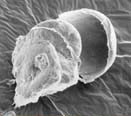A focus on evolution
by David R. Lindberg, Director |
||
 Scanning electron micrograph of hatching Erginus apicina embryo.
Scanning electron micrograph of hatching Erginus apicina embryo.
Just as Theodosius Dobzhansky stated that “Nothing in biology makes sense except in the light of evolution,” that is certainly the case in paleontology. Though defined as the study of ancient life, paleontology is much more. It is the unraveling of every aspect of the history of that life — its evolution and development, the relationships within that history, the interactions between organisms and their environments, the interactions among organisms, the big events and the little ones that comprise the history of life on Earth, and its possibility elsewhere. |
Evolution, as reflected in our great collections, is largely the modification of those developmental pathways that were present in common ancestors and that produced all descendant morphologies that we see through time. Developmental studies form a significant area of research in UCMP. These include the Hickman Lab’s study of the formation and metamorphosis of larval shells in gastropods, the Clemens Lab’s interest in tooth formation, and the Padian Lab’s work on ontogeny and bone formation in dinosaurs and birds. In other curators’ labs and Museum Scientists’ research programs, additional developmental and ontogenetic studies are ongoing, and this new emphasis is becoming readily apparent in our teaching and educational outreach as well.
Return to Front page |
|